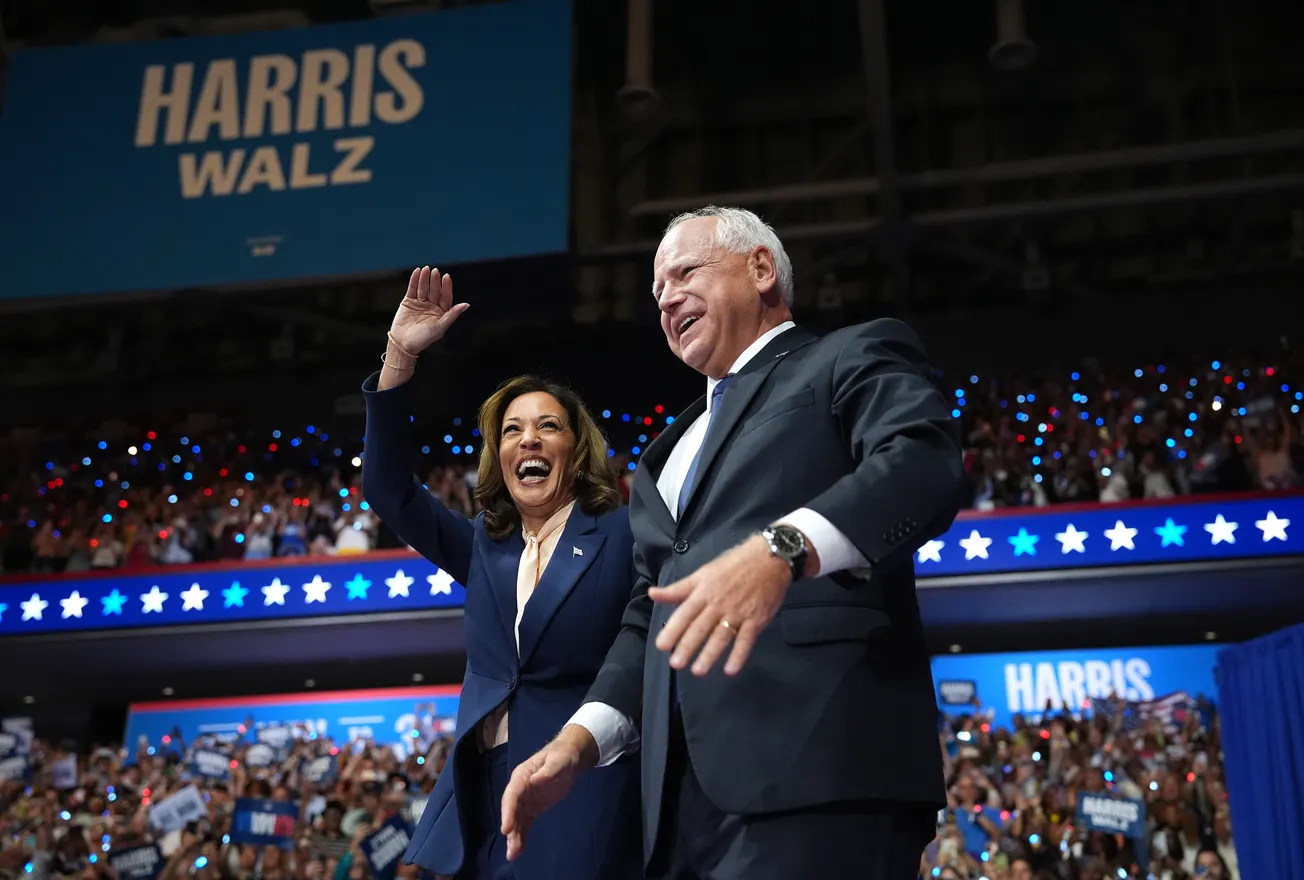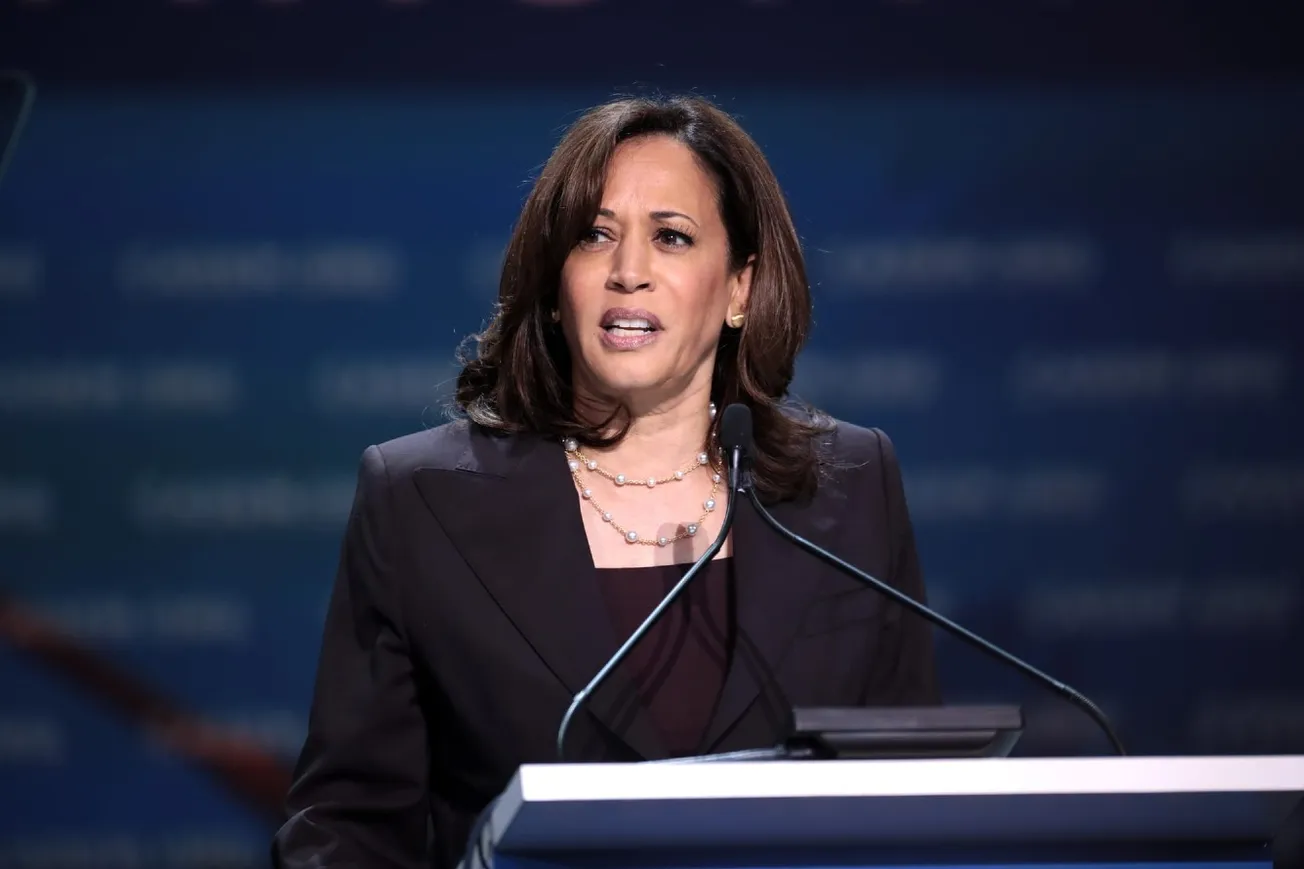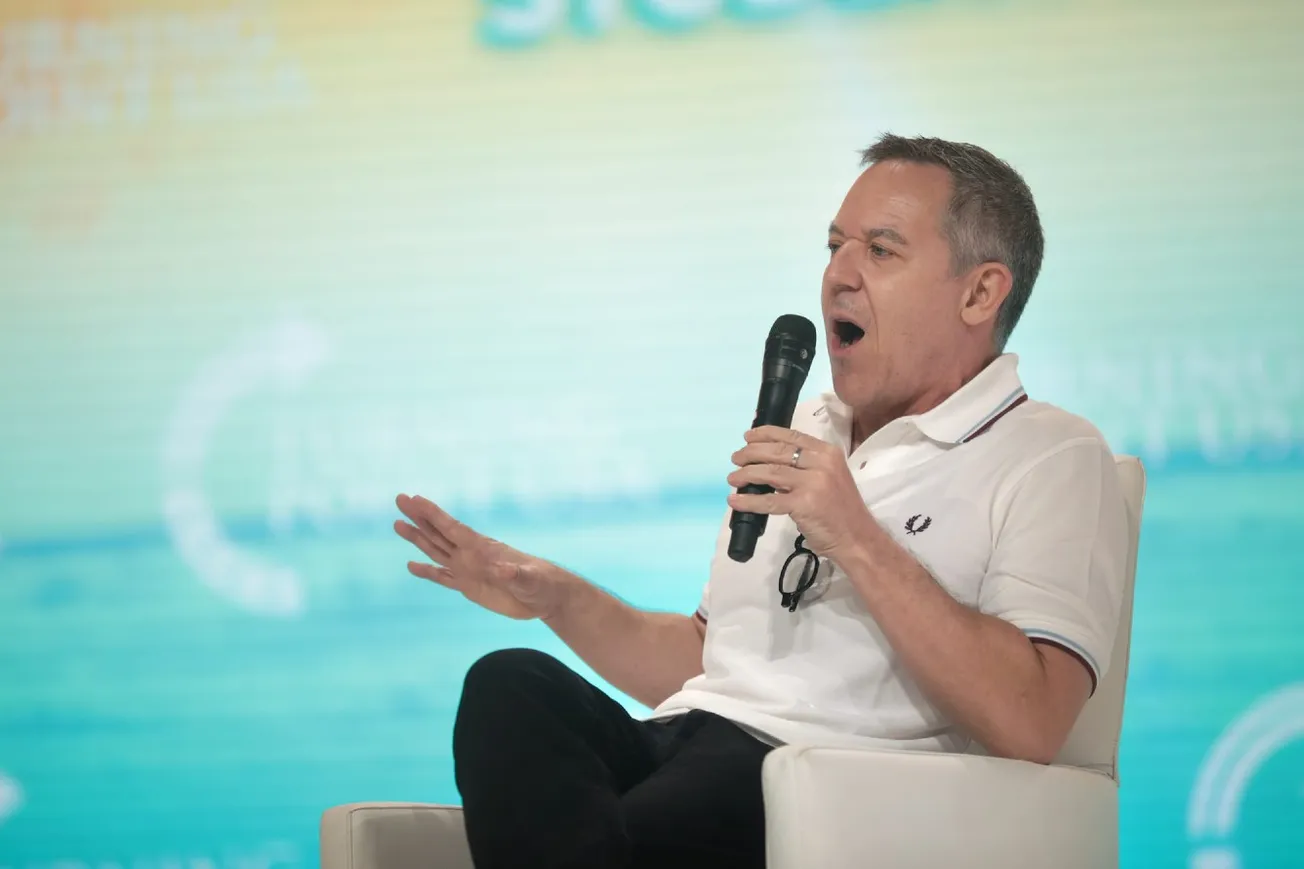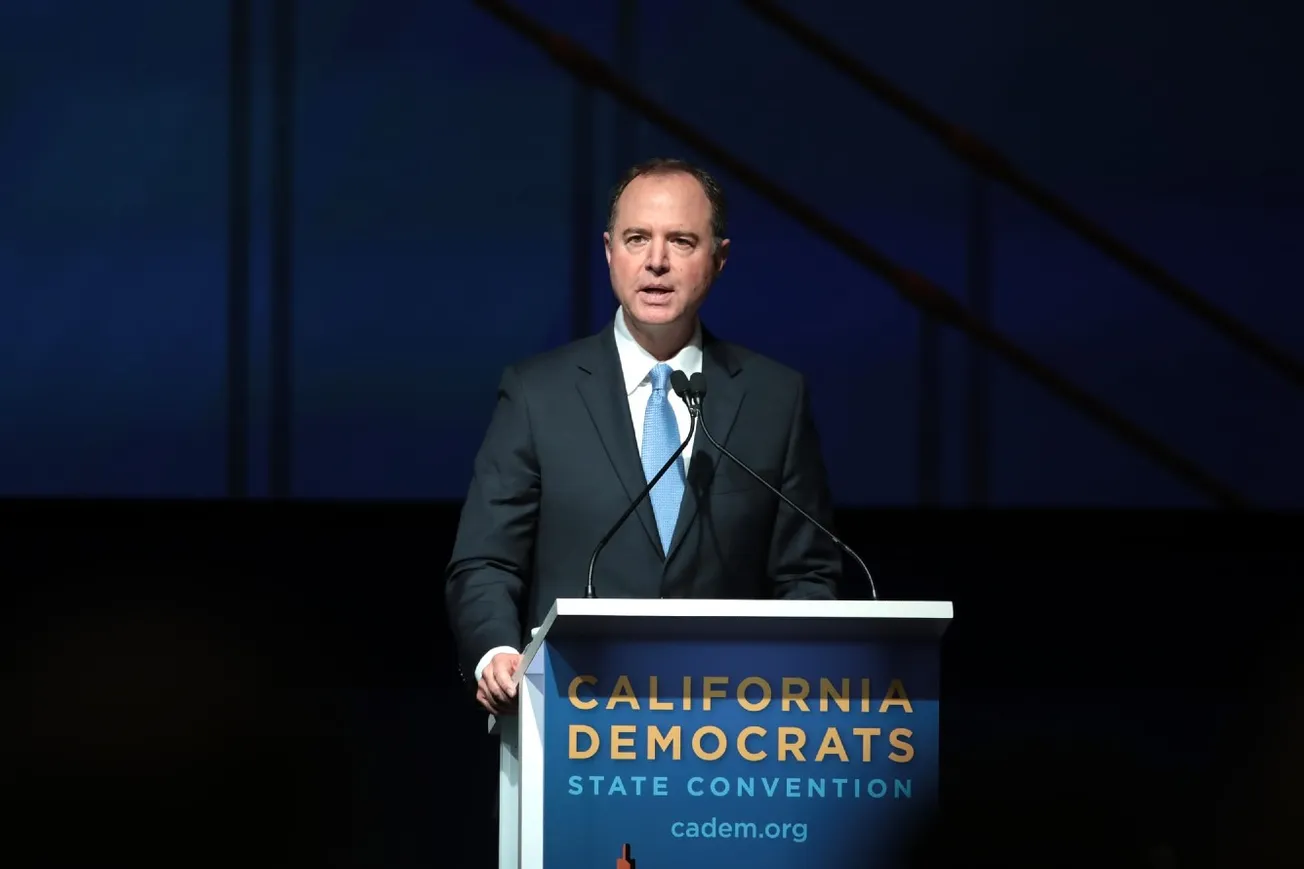While presidential candidate Kamala Harris avoids media questions about her proposed policies, both she and her progressive allies in the Democratic Party are already on record as favoring a number of highly controversial proposals, ranging from defunding the police to free college education. But do average Americans agree? The latest I&I/TIPP Poll provides answers.
The national online poll of 1,488 adults, taken from July 31-August 2, shows it’s a mixed bag. The poll has a margin of error of +/-2.7 percentage points.
It starts with a neutral question: “To what extent do you support or oppose the following actions?” That’s followed by 11 policy actions, for which respondents were given five possible responses: “Support strongly,” “support somewhat,” “oppose strongly,” “oppose somewhat,” and “not sure.” The answers were then aggregated to show simplified categories of “support” or “oppose.”
To avoid political bias, no party or candidate was mentioned in the question.
But the policies mentioned were not random. In fact, they represent a range of policy actions that Vice President Harris has either openly backed, proposed or expressed positive views on in recent years.
So the list represents a sounding of public opinion on Harris’ policy preferences before she became the Democratic Party’s candidate on Aug. 6, following a five-day “virtual” roll call vote of 4,567 Democratic delegates but no actual votes from Democratic voters. After that, she began hedging some of her previous policy stances.
By the way, that Aug. 6 party vote installing Harris as the candidate followed President Joe Biden’s agonizing July 21 decision to end his own campaign in response to intense pressure from Democratic officials, including former House Speaker Nancy Pelosi and Senate Majority Leader Chuck Schumer, along with big-dollar financial supporters of his own party.
Do Americans support or oppose these 11 progressive policy ideas, supported or proposed by Harris?
1. “The defund the police movement.”
Voters strongly opposed this idea, 64% to 27%. All major political parties opposed it: Democrats (52% oppose, 39% support), Republicans (76% to 17%), independents (66% to 22%). Surges in crime rates around the country as local governments slashed police spending proved to be highly unpopular with voters. A classic quality of life issue.
Harris’ choice of Minnesota Gov. Tim Walz may hurt her at the polls. During the 2020 riots, Walz allowed the rampant violence to continue before calling in the National Guard, leading to an increase in crime and massive destruction of property. Minneapolis turned seemingly overnight from a quiet, peaceful midwestern city into a violent, politically riven and racialized urban zone.
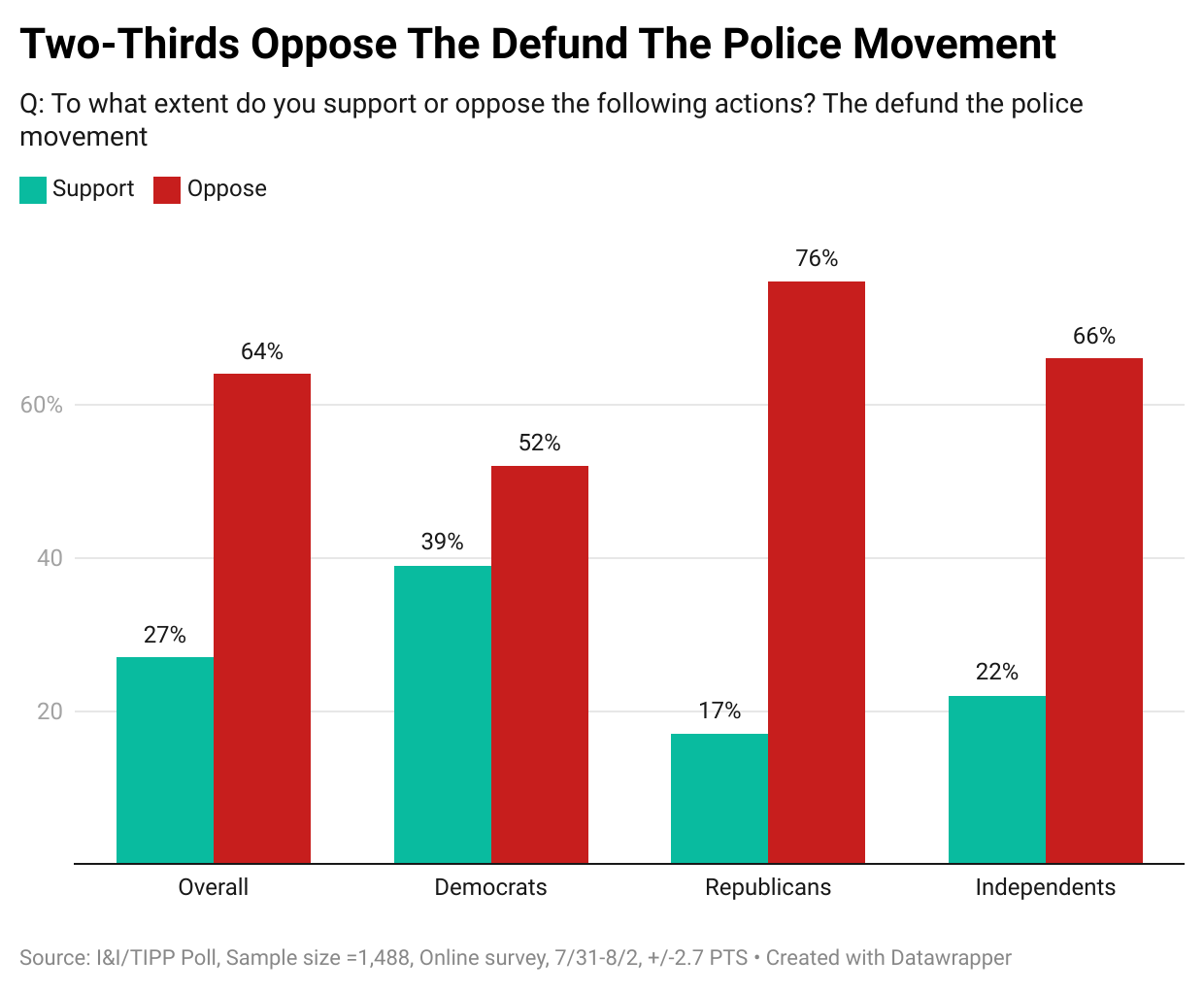
2. “Rapid transition to electric cars.”
Only 31% support this, while 61% oppose it. Democrats, however, support it 51% to 41%, while the idea gains backing from 16% of Republicans, and opposition from 79%. Independents, 65% oppose vs. 25% support, are in line with the GOP.
This idea initially looked like a winner, as sales of electric cars soared. However, buyers found out that electric cars, with their expensive batteries, could suddenly explode, cost much more to insure and repair, and required expensive charging equipment. Polls show large numbers of people regretted buying an EV. Moreover, it isn’t clear that EVs are all that much cleaner than regular cars.
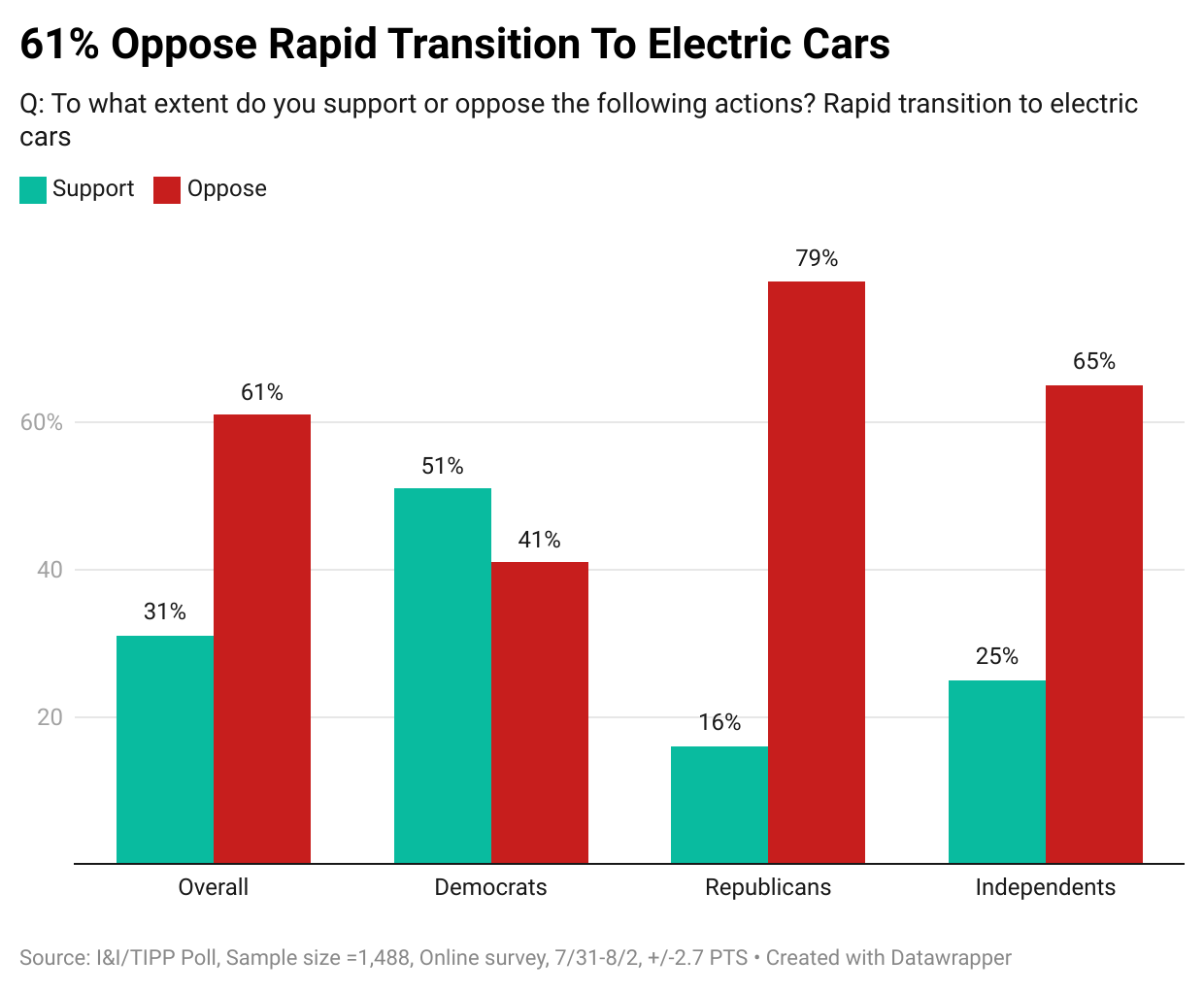
3. “Fracking for oil.”
Fracking has had a lot of bad PR, and it shows. Overall, those who support it (39%) are roughly the same statistically as those who oppose it (41%). But it plays poorly with Democrats, who oppose fracking by 51% to 31%, and independents, who reject it by 42% to 33%. Only Republicans show enthusiasm, with 31% opposing fracking but a solid 53% majority supporting it.
Many economic studies show solid benefits from fracking, especially for local communities. But the greatest benefits of all rarely get weighed in cost-benefit studies: The very real benefit of U.S. energy independence and the prospect of lower energy costs for average Americans, now suffering a fourth year of damaging inflation.
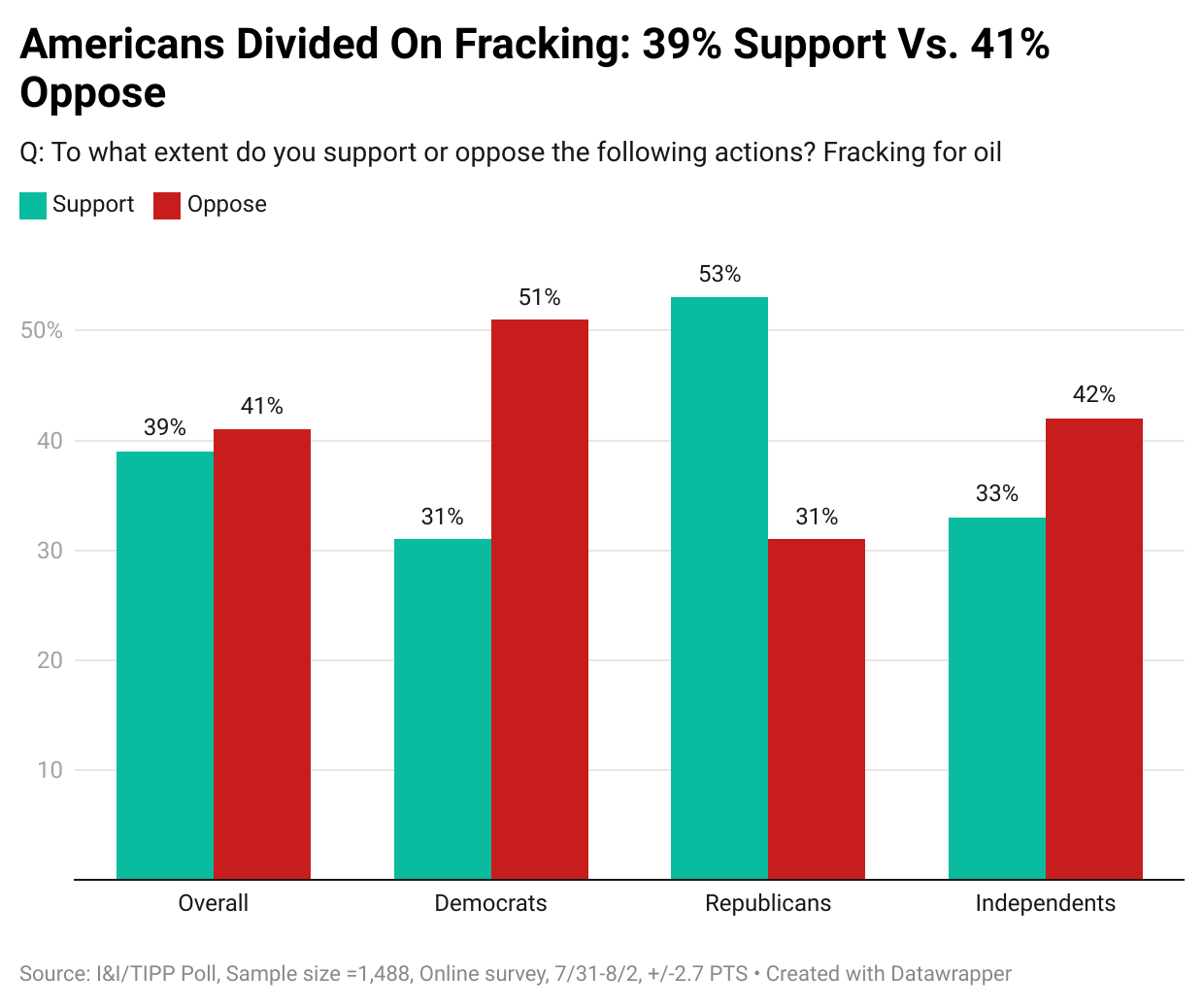
4. “Abolishing U.S. Immigration and Customs Enforcement (ICE).”
This idea is opposed by 65%, supported by just 22%, making it the least popular of all the ideas supported by Harris and Walz. And it’s bipartisan, with 56% of Democrats, 75% of Republicans and 66% of independents opposing the idea of shutting down our only border guard, apart from the U.S. military.
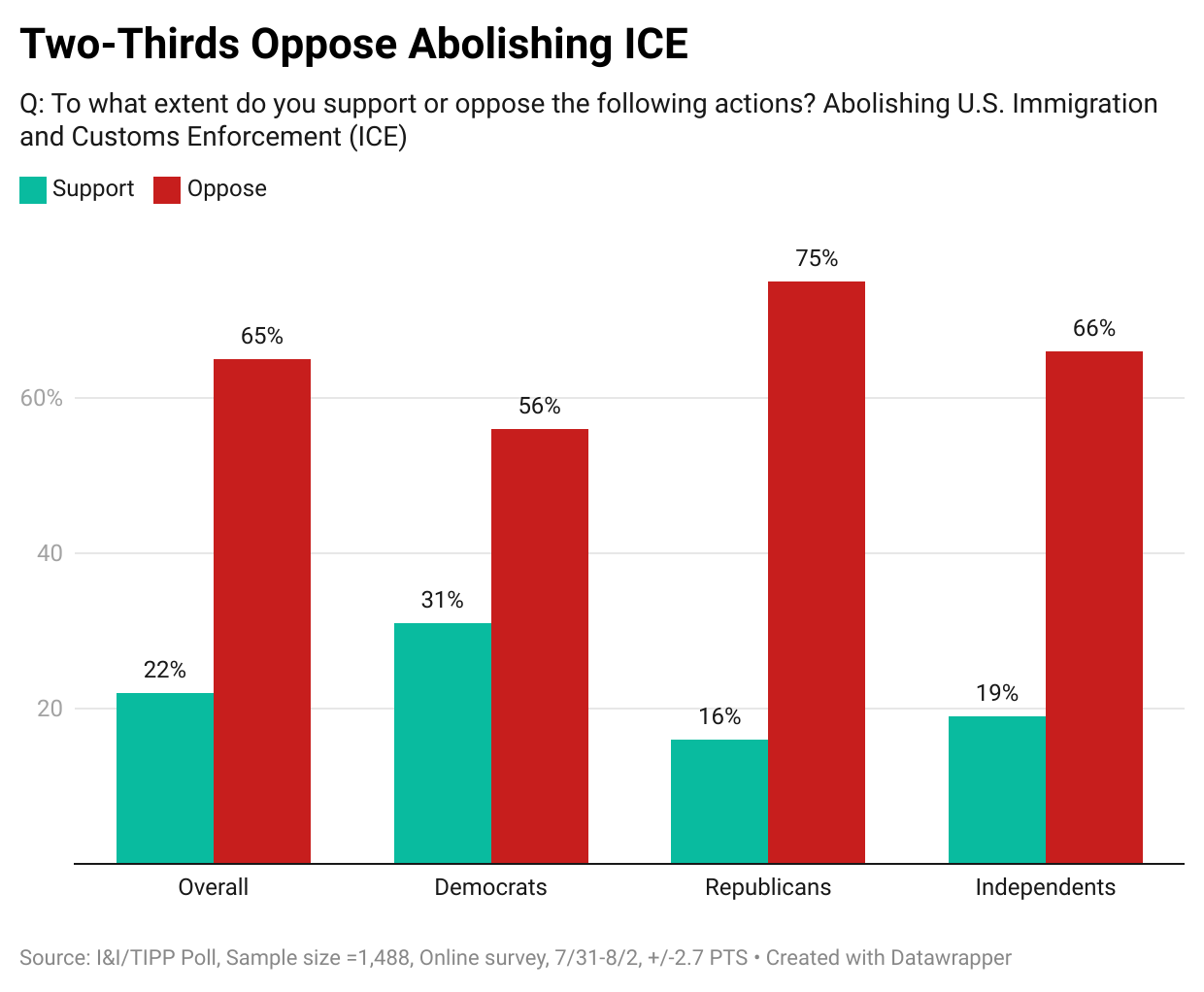
Harris once likened ICE to the Ku Klux Klan, even as illegal immigrants continued to cross the U.S. border by the thousands. Some 7.2 million to 10 million illegals have flowed into the U.S. during the Biden-Harris administration. The record of Harris, put in charge of the illegal immigration issue, hasn’t improved lately. The Biden-Harris administration let nearly 100 people on the Terror Watchlist into the country, according to a congressional study, while also allowing in “tens of thousands of migrants from countries that could present national security risks – including 2,134 Afghan nationals, 33,347 Chinese nationals, 541 Iranian nationals, 520 Syrian nationals, and 3,104 Uzbek nationals.”
5. “Eliminating private health insurance and replacing it with Medicare for all.”
This idea has significant backing, with 42% overall saying they support the idea, while 44% oppose it. Another 14% said they weren’t sure. The political differences are clear: For Dems, 56% support the idea, while just 29% oppose it. Independents break dead even: 42% support to 42% oppose. Only among GOP members is it hugely unpopular, with 27% support to 61% opposition.
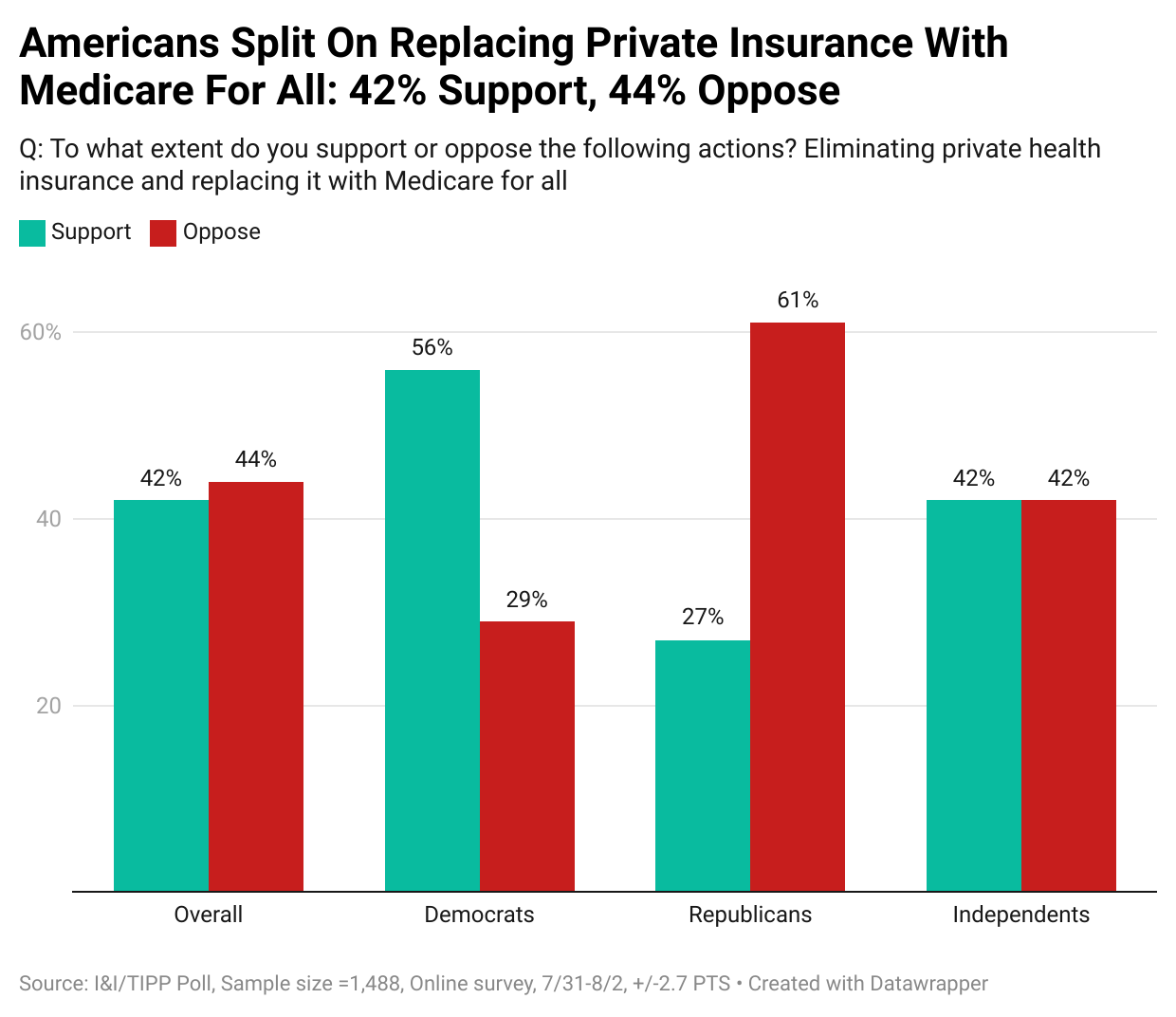
It pays to note that once voters factor in the costs of “Medicare for all,” it’s likely to lose its luster. One study notes that 32% increases in taxes on both workers and businesses would be needed to fund such a program. Would care be better? Not likely. Bureaucrats, not patients and doctors, would make decisions on health care treatment priorities. Already, even with out the “for all” part, Medicare is expected to run an astoundingly large deficit through the remainder of this century: $78.4 trillion, by the government’s own estimates. Medicare is, in effect, bankrupt. Make it bigger, and the bankruptcy gets worse. When Americans face this reality, will they still want “Medicare for all”?
6. “The death penalty for cop killers.”
This is another highly popular idea. Some 60% of Americans support the idea, versus 28% who oppose it. A majority of all the major political affiliations support the idea: Dems (52%), GOP (69%) and independents/third parties (58%). Strong bipartisan support.
Unfortunately for Harris, she has become identified with this issue – but on the other side. While running for San Francisco district attorney in 2004, Harris’ spokesperson said she “would never seek the death penalty.” She later proved it when David Hill, a gang member, killed a police officer named Isaac Espinoza. The murder sparked widespread outrage. “Two days after Espinoza’s death and two days before Espinoza’s funeral, Harris . . . announced that she would not seek the death penalty for Hill,” reported ABC News. Politically, Harris is clearly on the wrong side of this issue.
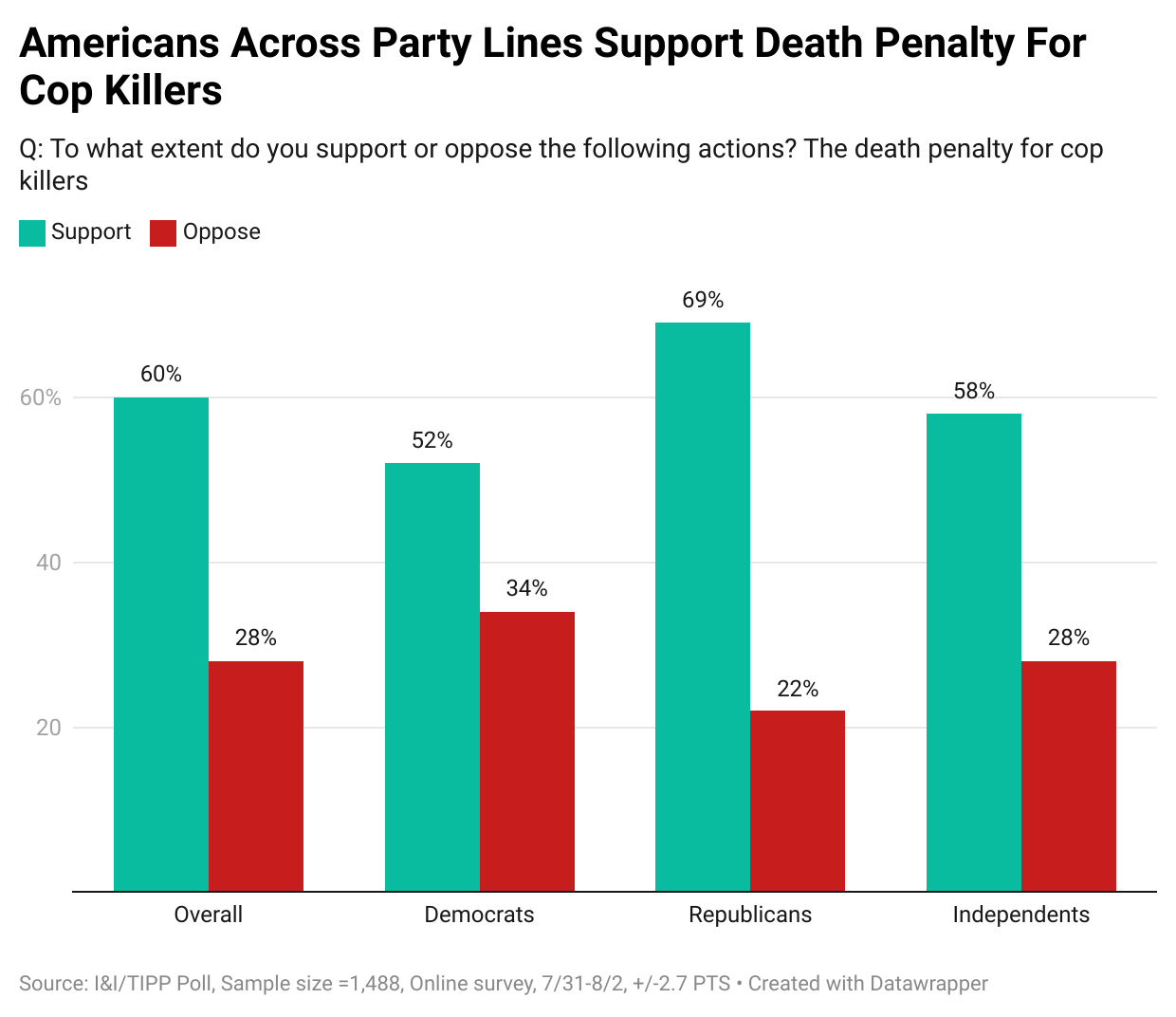
7. “Allowing felons to vote.”
Despite a wide variety of laws across the country in virtually every state permitting felons to vote (after serving time in prison, parole, probation, and good behavior, among other requirements), the idea is not universally accepted. That’s especially true of felons who are currently incarcerated. Indeed, in the I&I/TIPP Poll, just 40% supported the idea of letting felons vote, while a plurality of 49% opposed it.
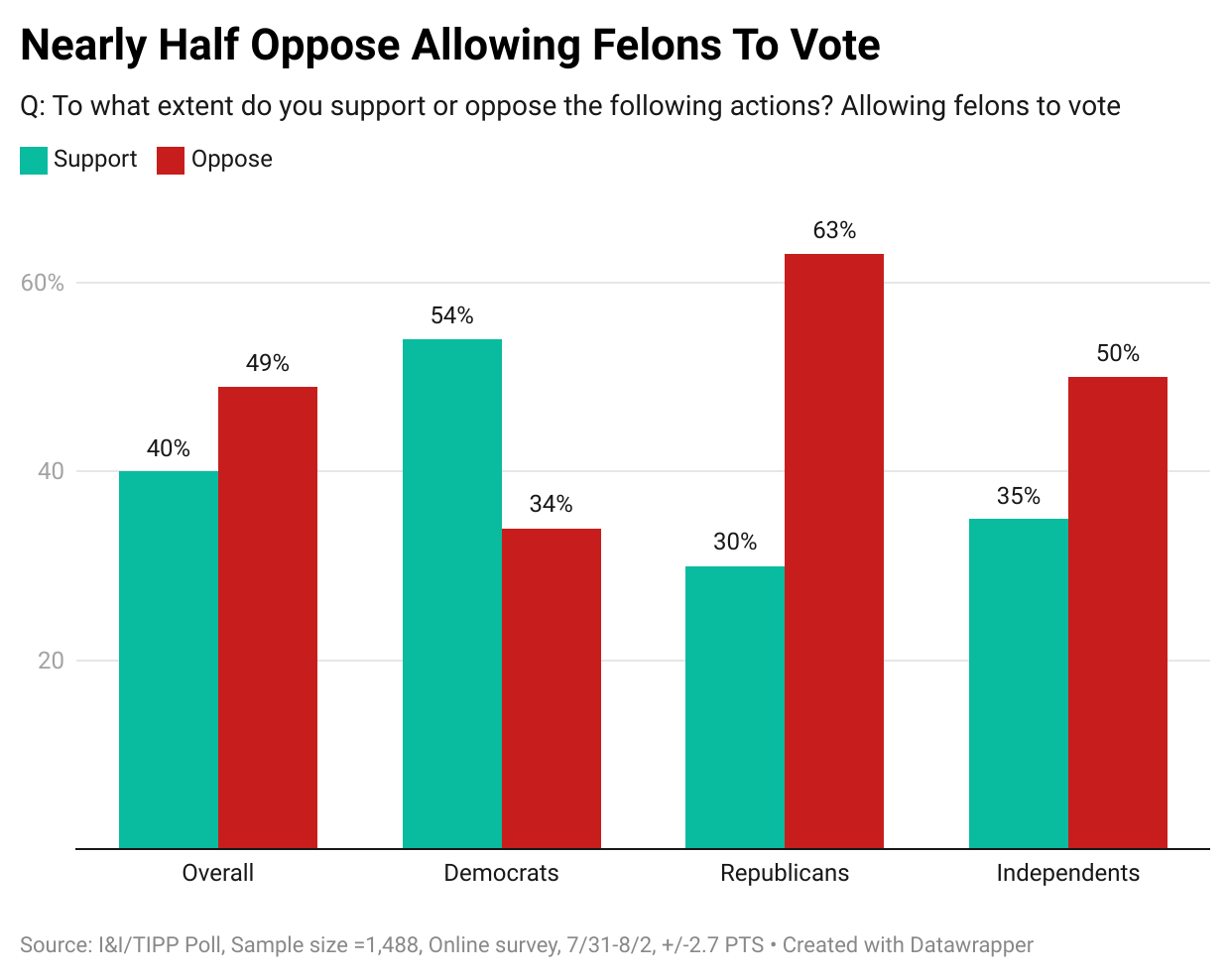
Those favoring the idea note that some 6 million people at any given time are unable to vote due to restrictions. The Sentencing Project notes this has a disproportionate impact on African-Americans, with 7.4% of that population not able to vote, compared to just 1.8% of the rest of the U.S. populace. But others assert that voting is a privilege, not an absolute right. Harris and Walz have both backed expanded voting rights for felons.
8. “Health insurance for illegal aliens.”
This is another sore spot for American voters, 62% oppose the idea, while 28% support it. Soaring costs for medical care have sensitized voters to the idea of people coming here for essentially free care, at taxpayer expense.
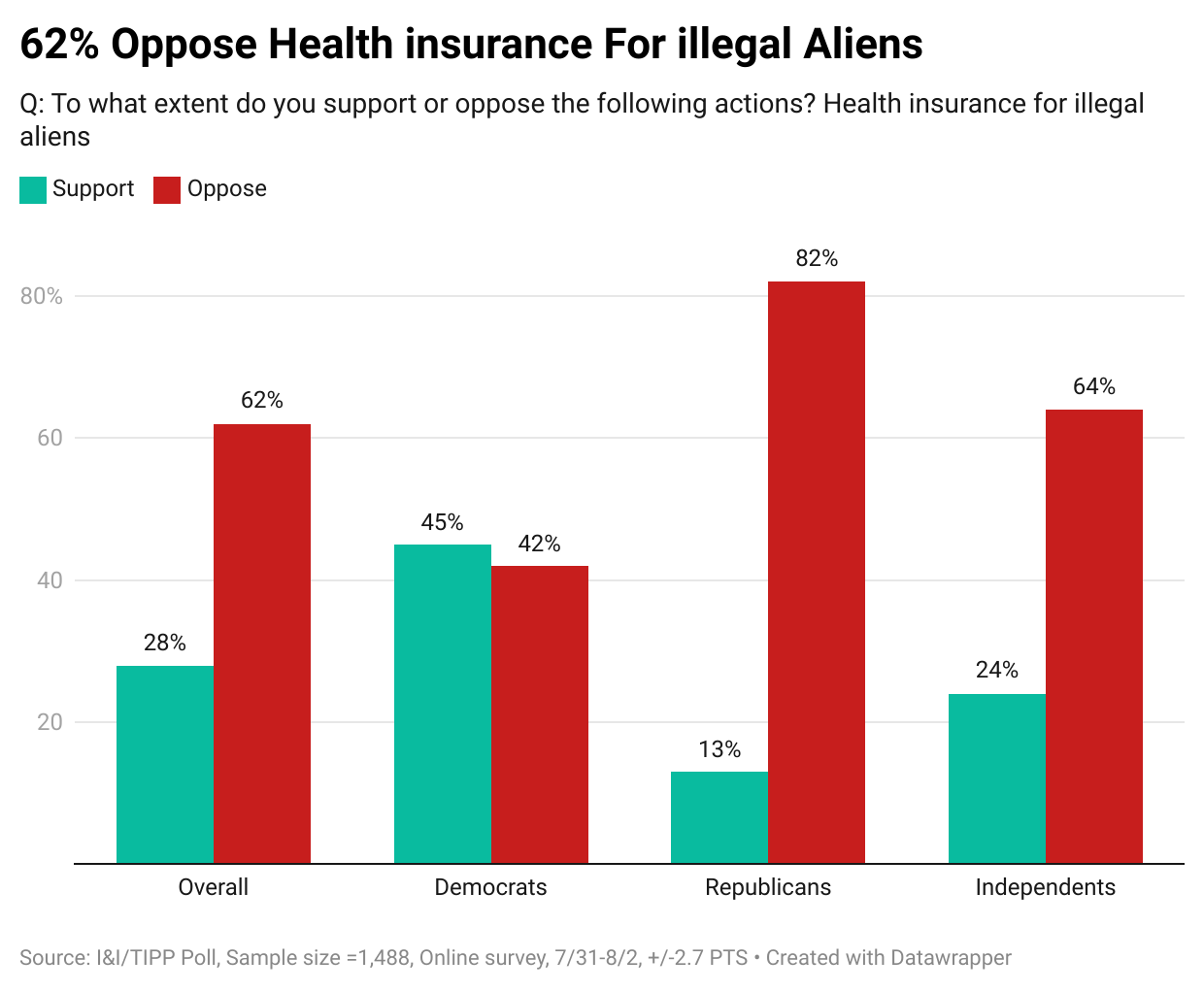
It’s already happening at the state level, where a “growing number of states are opening taxpayer-funded health insurance programs to immigrants, including those living in the U.S. without authorization,” NPR reported. As of the end of 2023, 11 states and Washington, D.C. already gave illegals free care. For many illegal immigrants without insurance, there is another alternative: Hospital emergency rooms, which by law can’t turn away patients.
9. “Pathway to citizenship for illegals.”
This is another tossup question, with 45% opposing it, but 46% supporting it. Once again, politics defines the response: 69% of Dems support a pathway to citizenship, while only 22% oppose it. Republicans are almost exactly the opposite, with 67% opposing the idea, and 25% supporting it. Independents split the difference, 46% oppose, 43% support.
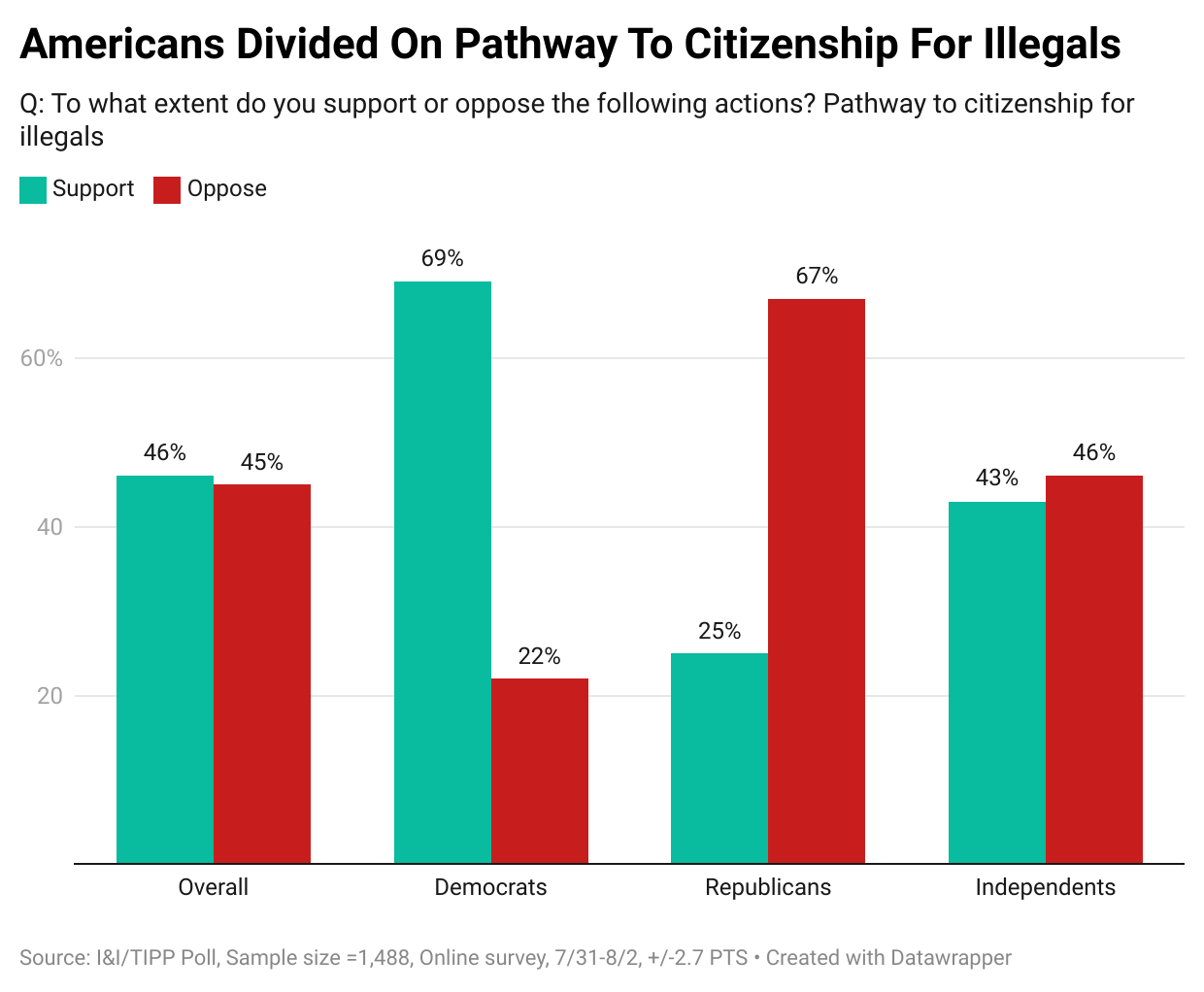
Harris has called for a “meaningful pathway to citizenship” as a way to “fix the immigration system.” It’s a tough argument to make stick, given that rewarding those who come here illegally would only encourage millions of others to come. A 2021 Gallup poll taken across the 33 countries of Latin America and the Caribbean found that of the 450 million people in the region, “35% — or 42 million — said they want to (emigrate) to the United States.” Despite the closeness of the polling, it might be a tough sell to immigration-wary voters.
10. “Student loan waiver.”
A popular idea, with overall 54% support and just 38% opposition. But again, there is no unanimity on the idea of loan forgiveness. While Dems show overwhelming support for the idea, 77% to 17%, and a bare majority of independents also back the idea, 51% to 37%, Republicans oppose it by 61% to 32%.
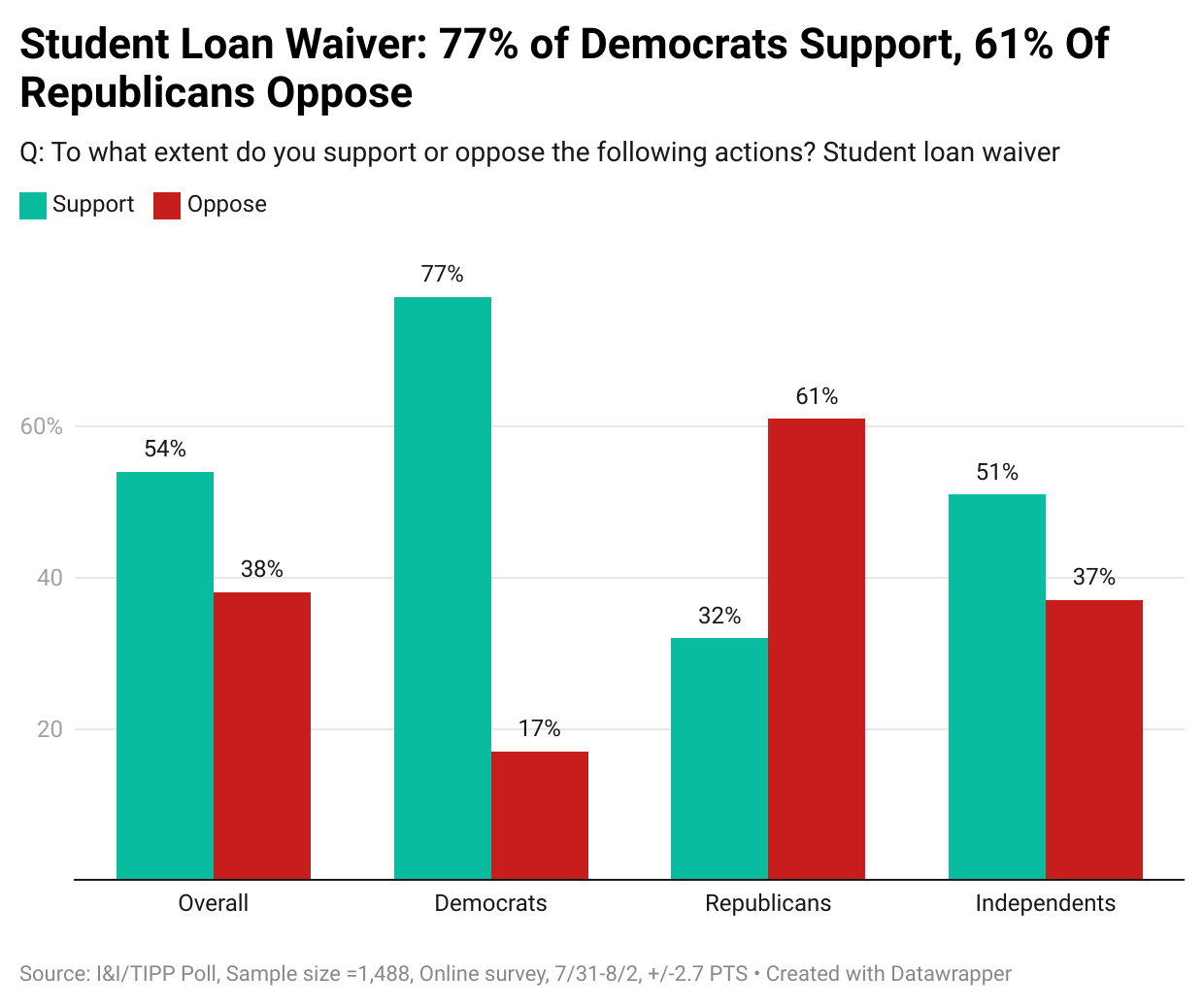
If Harris were to win the presidency, but Republicans kept control of one or both houses of Congress, she might have a big problem getting a student loan waiver law passed. And 49% of Republicans say they oppose such a policy “strongly,” which matches the share of Democrats who support the plan. Stalemate anyone? Middle-class voters might be swayed when it’s pointed out that “waivers” or “forgiveness” aren’t free; they must be paid for with higher taxes, even by taxpayers who have no children in school to benefit. Such a plan would cost close to half a trillion dollars, according to one estimate, and “effectively penalizes people who scrimped and saved to pay for college, as well as the majority of Americans who don’t go to college.”
11. “Free college education.”
Once again, very popular, with 62% support and just 30% opposition. The differences between the political groups aren’t as big either: Dems 80% support, 13% oppose; Reps, 43% support, 49% oppose; indies, 64% support, 28% oppose.
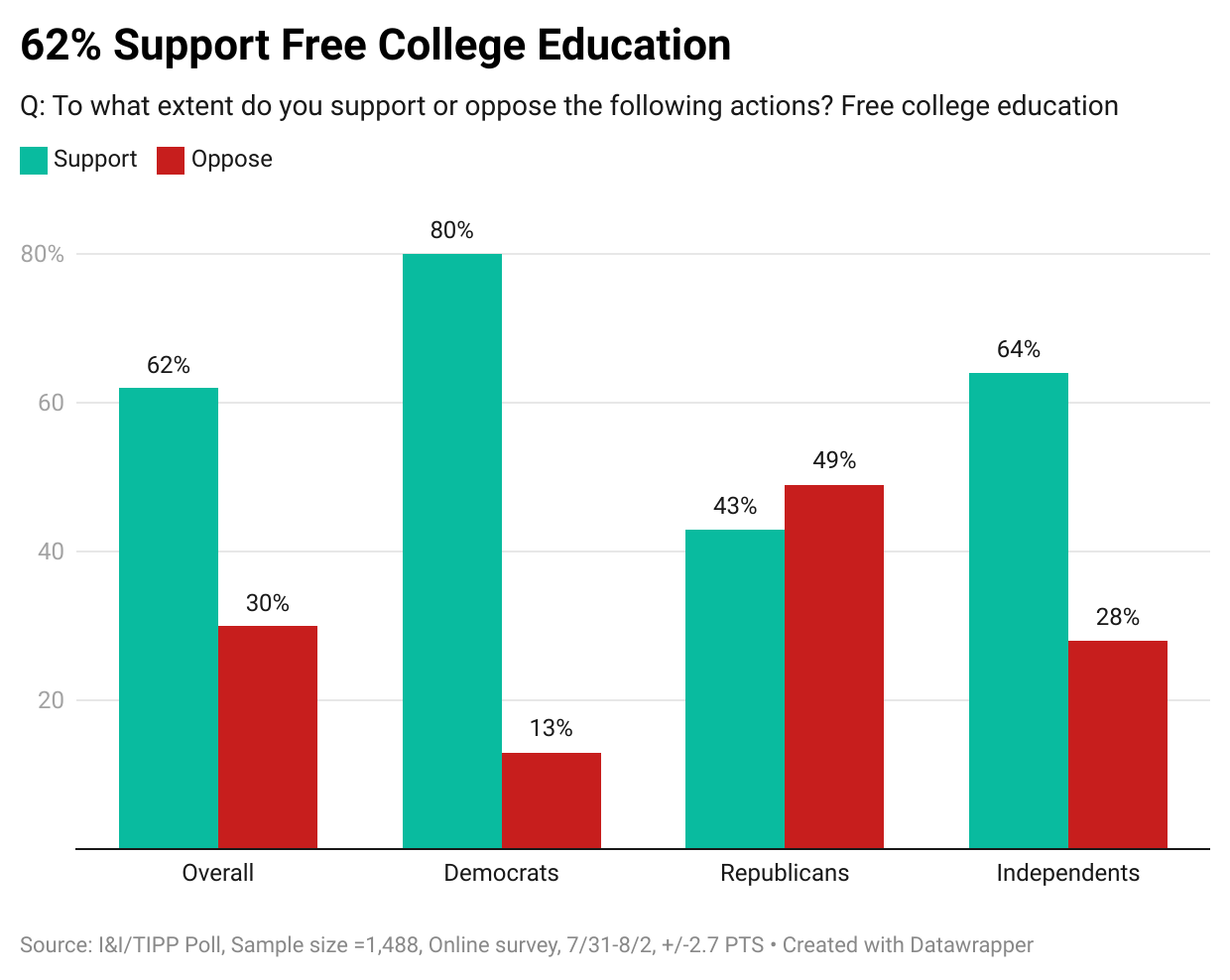
Slam dunk? Not really. More and more companies are abandoning requirements for college degrees in exchange for specific skills they need. Meanwhile, a small but growing number of young people are avoiding four years of costly higher education, which won’t necessarily yield more money or a better work life, in exchange for well-compensated skilled jobs as carpenters, plumbers, electricians or other well-paid occupations that require training, not four years of ideological indoctrination. Why should taxpayers foot the bill for higher education that employers increasingly view as worthless?
As the I&I/TIPP poll plainly demonstrates, only two of the 11 signature policy proposals backed by the Harris-Walz presidential ticket find convincing popular or majority support. Those both involve paying for higher education.
The rest, from “Medicare for all” to “health insurance for illegal aliens,” get either a tepid response from voters, or outright rejection. It would seem to be a tough road for the Harris-Walz team to travel with the policies both have supported.
As a matter of political strategy, look for the Democratic candidates to repudiate all or major parts of some of their most unpopular policies as they seek to find voters in the center of the spectrum. Neither party can win without winning the vote of independents, the swing vote of every modern presidential election.
I&I/TIPP publishes timely, unique, and informative data each month on topics of public interest. TIPP’s reputation for polling excellence comes from being the most accurate pollster for the past five presidential elections.
Terry Jones is an editor of Issues & Insights. His four decades of journalism experience include serving as national issues editor, economics editor, and editorial page editor for Investor’s Business Daily.

